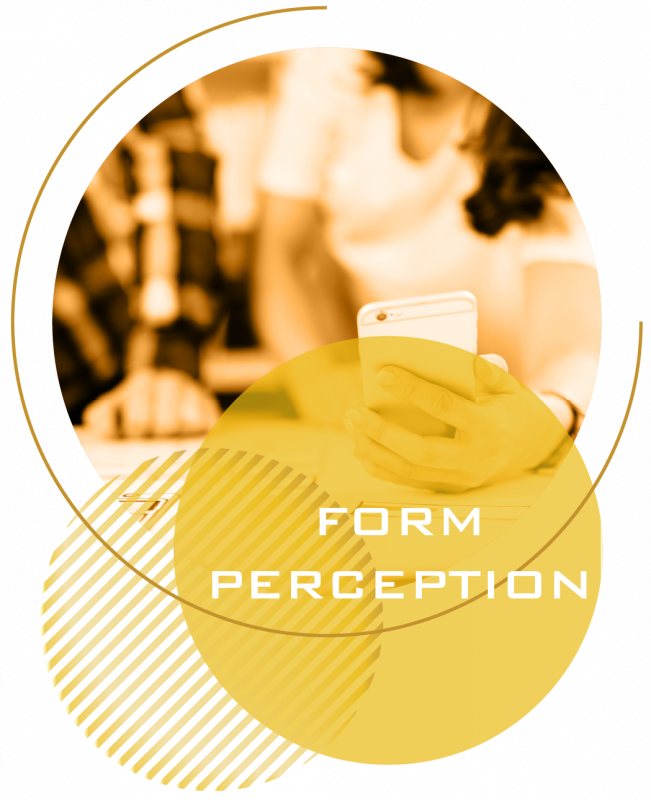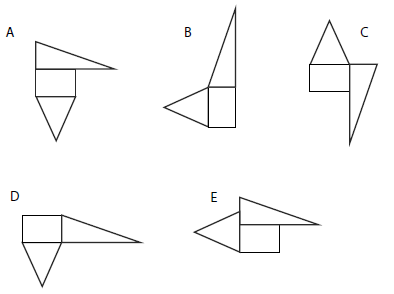
HOW TO PASS IQ AND APTITUDE TESTS
Hundreds of sample test questions and answers for IQ and Aptitude Tests!
4.9/5 Rating | 1,000+ Reviews ![]()
Training That Works
Discover insider secrets and a masterclass of testing practice material that has helped 100s of candidates pass their assessment tests.
Unlock Your Potential
Whether you’re just starting out or you know what to expect, you will get access to 100s of questions, with solutions that will catapult your chances of success.
Powerful Resources
Get instant access to the material right now which includes verbal reasoning, non-verbal reasoning, and numerical reasoning.
ABOUT IQ AND APTITUDE TESTS
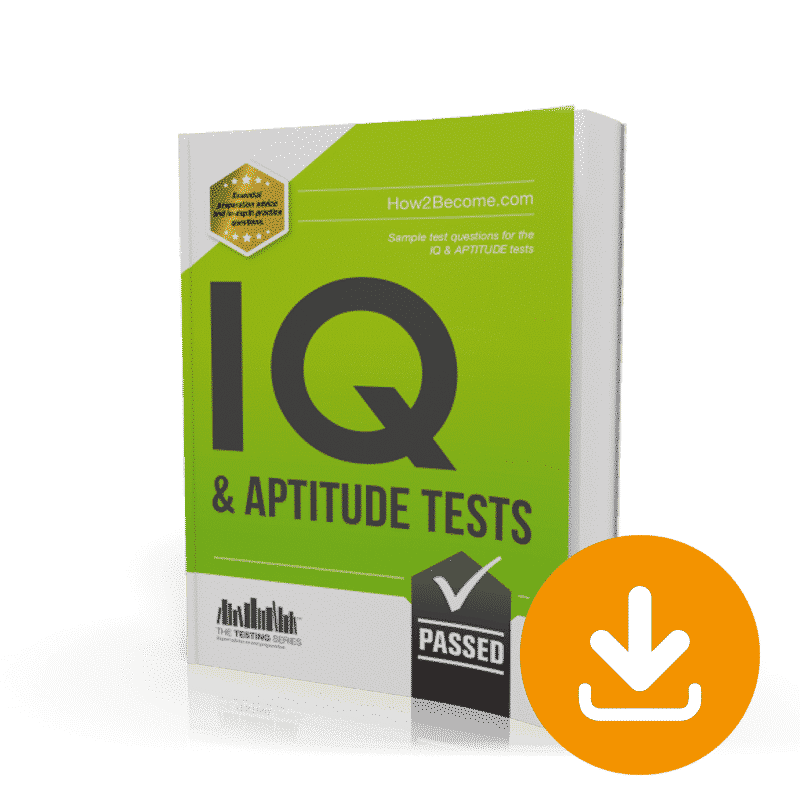
The majority of the assessments you will come across will be multiple-choice in nature. This essentially means that you will be offered up to five or six different answer options. It will be your task to choose the right answers from the ones provided. Many people decide to guess if they are unsure of the correct answer; however, this is not good practice simply because many test administrators will deduct marks for inaccurate responses.
Of course, it is unlikely you will have to sit or be assessed against all nine forms of psychometric testing during your assessment; however, you should prepare for the more common type of assessment such as numerical reasoning, verbal reasoning and spatial reasoning.
TYPES OF IQ AND APTITUDE TESTS
Here are a few examples of different types of assessments:
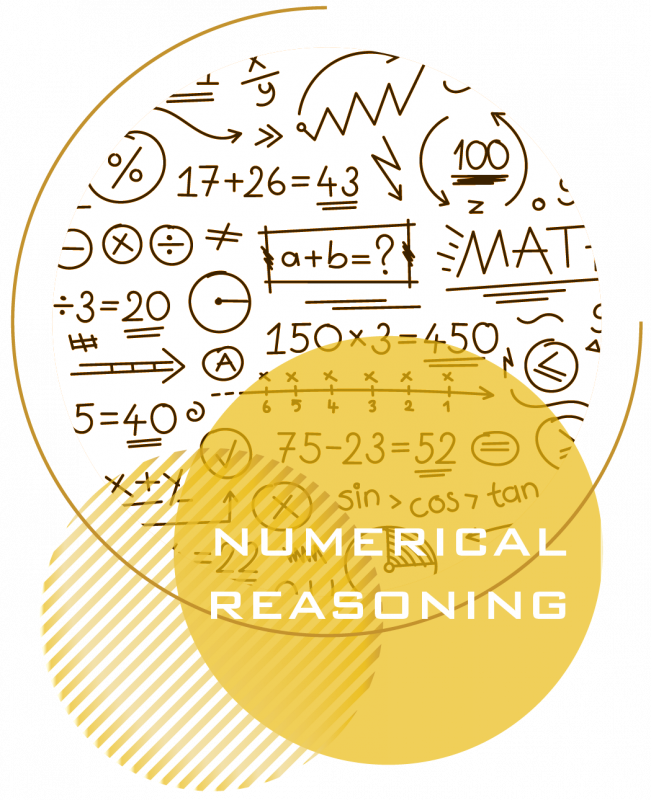
NUMERICAL REASONING
This is where you will be required to work with numbers such as addition, subtraction, division and multiplication.
VERBAL REASONING
During this form of test you will be required to understand words and passages.
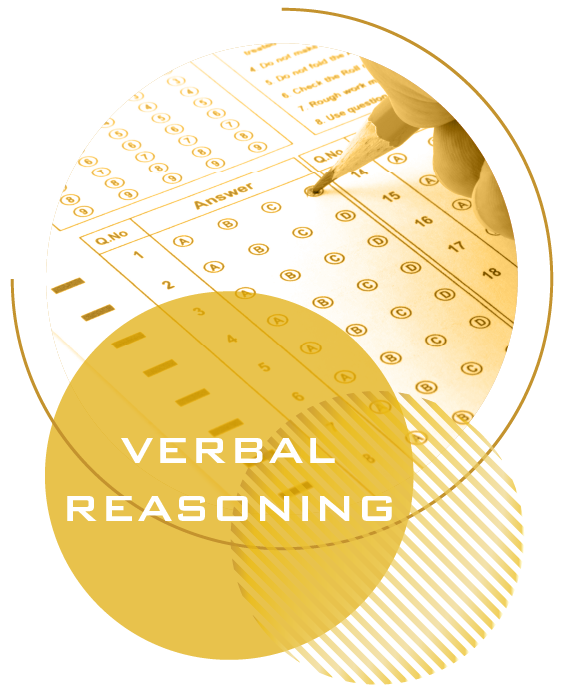
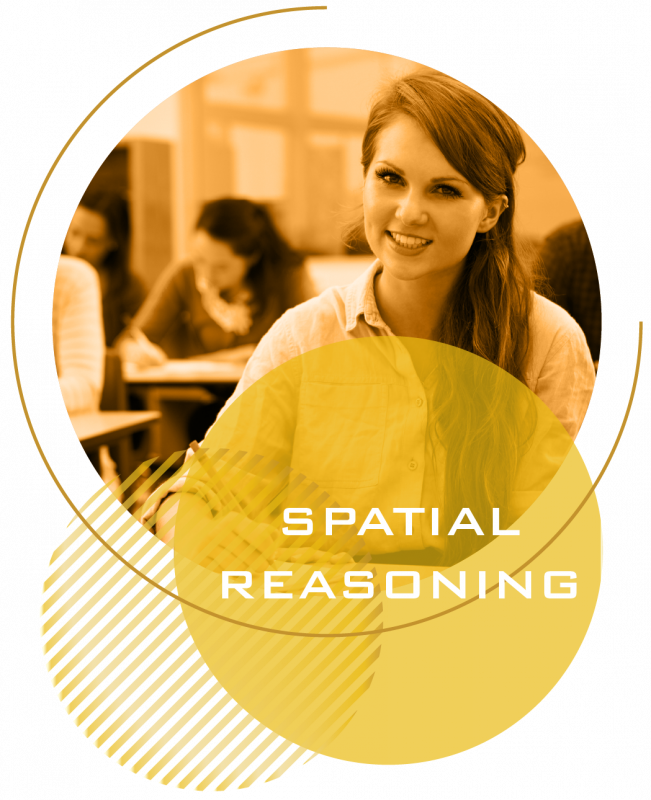
SPATIAL REASONING
Working with shapes and patterns to interpret their meaning.
MANUAL DEXTERITY
Being capable of working with your hands. The Fire Service require prospective candidates to carry out this type of test.


FINGER DEXTERITY
Again, this is a form of practical assessment where you are required to use your fingers quickly and accurately. This may be whilst playing the piano or guitar during a grading assessment.
MOTOR COORDINATION
Have you ever constructed a piece of flat pack furniture from IKEA? If you managed to complete it successfully and in good time without any spare parts left then you have good motor coordination! This type of test is also used where there is a requirement in the role to use a computer keyboard.

CLERICAL PERCEPTION
Examples of this form of aptitude testing include proof reading and analysing graphs or pie charts.


PASS YOUR IQ AND APTITUDE TEST

- Hundreds of sample questions and answers;
- Learn how to pass IQ tests;
- Essential test preparation advice;
- Different testing questions including mental arithmetic, number sequences, spatial reasoning, grammar and comprehension plus much more!
Sample IQ and Aptitude Test Questions
To help you get a better understanding of what an IQ and Aptitude test involves, let’s take a quick look at a few sample questions.
FREE | 4 Questions
IQ and Aptitude Test Practice Questions
A square has a perimeter of 36 cm. What is the length of one side?
On Monday it takes Lucy 52 minutes to get to work. On Tuesday it takes 40 minutes, Wednesday takes 51 minutes, on Thursday it takes 1 hour 2 minutes and on Friday it takes 1 hour 30 minutes. How long did her average commute take?
ANSWERS
59 minutes
C
- The shapes have two lines of symmetry.

Pass Your IQ and Aptitude Test. First Time.
Crafted for everyone, no matter your skill level or background, this download was made to help you achieve one goal: pass your aptitude test.
WHAT WILL YOU LEARN?
Scoring Criteria
Essential information about how you will be assessed during a psychometric test assessment.
UP-TO-DATE FOR 2024
All exercises have been verified by our assessment panel experts for the 2024 tests.
PRACTICE SAMPLE TEST QUESTIONS
Step-by-step information on how to pass any style of psychometric test.
FULLY-WORKED SOLUTIONS
Solutions for all questions so you can be confident in learning and improving your score.
INSIDER SECRETS
Insider tips on how to answer the questions and a breakdown on how you will be scored.
SCORE-BOOSTING STRATEGIES
Get ahead of the competition with unique and proven strategies 16 years in the making.
Customer Success Stories
Having helped 1,000s of people pass their assessment tests for over 16 years, it is no wonder our customers love us…

This book comes with ample practice tests which help you learn how to pass aptitude tests.

Very addictive book, once you start you don’t want to stop.

Excellent book to prepare yourself for any military career! Definitely recommend, its well presented and provides good testing tips.

Good book, perfect for preparing for IQ tests. Very helpful exercises and explainations!

Within the IQ and Aptitude tests book there are tips and tricks to train the brain which will help you to gain a better understanding of what these tests mean and how you can pass them. There’s 40 questions in each one test supplied with answers and explanations at the back which is excellent for when you are adamant about your answer yet your children have a different one!

WHAT’S INCLUDED IN YOUR DOWNLOAD?
Complete guidance to ensure you pass the selection tests.
- Hundreds of sample questions with answers and explanations to ensure you learn from the questions you get wrong.
- Walkthroughs with detailed examples showing you what to expect and how to answer each question type to ensure you master psychometric tests.
- Advanced strategies, to build your confidence prior to the real test.
- Numerical tests covering mental arithmetic, fractions, ratios and number sequences.
- Verbal reasoning tests covering grammar and comprehension, and general verbal aptitude.
- Non-verbal reasoning tests covering spatial reasoning, abstract reasoning and diagrammatic reasoning.
- Expert assessment strategies, tools, and tips for overcoming difficult questions, and scoring the highest possible marks.

PLUS…BONUS!

BONUS
PLUS…30-Day Free Subscription Trial To The Online Psychometric Tests Testing Platform!
As well as life-time access to the IQ and Aptitude Tests download, this product also includes a 30-day free trial to Online Psychometric Tests Testing Platform (usually £9.99 + vat per month).

- 100s of additional practice questions to help boost your scores!
- Practice all of the test questions under timed conditions using our online testing suite.
- Instant online access.
- Compatible on mobiles, tablets and computers.
- Scores are tracked so you can focus on areas that need improvement.
Important: This powerful free trial costs £9.99 + vat every month for everyone else! You will get unrestricted access to all of the quick-win strategies to give you the advantage right away.
Worth £9.99, Yours FREE for 30-days*
*We want you to know: This is a subscription service that is charged at just £5.95 + vat per month after the 30-day trial expires. No minimum term. If you cancel before the 30-day trial ends, you will not be charged. Please see our terms for full details.
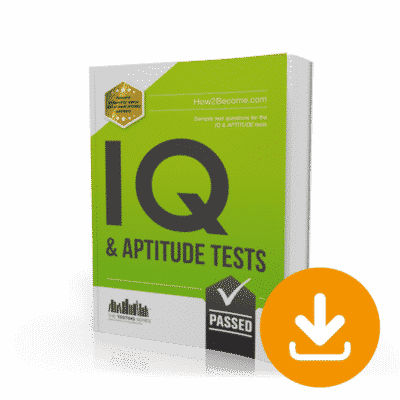
✓ 30-Day Money-back Guarantee
Did you know? All orders with How2Become are protected by our 30-day money-back guarantee. What ever the reason…or no reason at all…you can have your money back if this resource isn’t right for you (see our terms for full details).
WHY BUY WITH HOW2BECOME?
CREATED BY THE EXPERTS
PROVEN TRAINING
EXCLUSIVE FREE BONUSES
Firstly, these guides are created by us and our team of experts – we have all the answers to your questions and will help you succeed (like we’ve been doing for the last 16 years), we update our material frequently and you can contact us at any time with any questions you have.
Secondly, we provide exclusive bonuses with all our products that you won’t find anywhere else. These bonuses include free guides, powerful online testing suites and more!
Finally, our guides and training just work. Take a look at our TrustPilot page where you will see our rating of 4.9/5. There, our customers share their positive buying experiences and more importantly the time-saving success our resources have given them (hint: they passed their assessment).

Learn how to PASS YOUR ASSESSMENT
We’ve helped 1,000s of aspiring applicants in their journey to succeed in a new career. Trust the UK’s #1 careers and education specialists to help you secure your role.
Get instant access »“Great variety of question types, exposes areas of weakness and gives you the means to improve. Clear and concise. Confidence builder. Great practice!”












